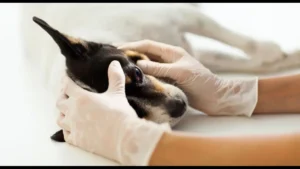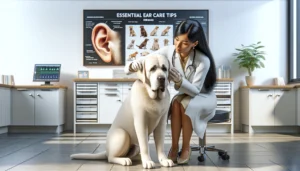As dogs age, their lives and care needs change significantly. If you want your dog to stay healthy and happy, it is important to approach this time in your dog’s life with kindness and understanding. This detailed guide reveals tips and tricks for caring for senior dogs, focusing on their specific nutritional needs, exercise, mental stimulation, and overall health.
Table of Contents
ToggleUnderstanding the Aging Process in Dogs
Aging in dogs can manifest itself in a variety of ways, including reduced movement, loss of senses such as hearing and vision, and an inactive lifestyle. As a result of these changes, their daily care and schedules need to be reconsidered, demonstrating the importance of recognizing and meeting their changing needs.
1. Tailored Nutrition for Optimal Health
As dogs age, their metabolism slows down. So changes in their diet are needed to prevent them from gaining weight and developing health problems. Senior dog food is designed to provide proper nutrition, including the right amount of protein, reduced fat, and important nutrients to support aging organs and joints. Talking to your vet regularly can help you develop the best diet plan for your pet, and eating vitamin-rich foods can help combat the damage of aging.
2. Exercise moderately every day
Exercise is still important for older dogs, but it must be tailored to their needs. Short, easy walks or quiet indoor play can help keep them healthy without putting too much strain on their bodies. Swimming is a great low-impact exercise that can help older dogs keep their joints healthy and their muscles strong.
3. Visit your vet regularly
Regular visits to the vet are important to detect and treat health problems that arise as we age. These tours can monitor common conditions in older dogs such as arthritis, diabetes, and heart disease. Addressing these health problems before they worsen can significantly improve the quality of life for older dogs.
4. Spiritual enrichment and stimulation
The mental health of older dogs is just as important as their physical health. Doing brain-stimulating things with them, such as scent games, gentle training exercises, or interactive toys, can help them maintain cognitive function and absorb the effects of worry or confusion as they grow older.
5. Comfortable living environment
Adapting your dog’s living space to his needs can have a big impact on his comfort and health. For older cats, safer, more comfortable spaces may include orthopedic beds that support their joints, make water and food bowls easily accessible, and remove obstacles they need to climb or jump over.
6. Helps control pain and mobility
Managing pain and mobility issues is important when caring for an older dog. Other treatments, such as massage, acupuncture, or chiropractic care, can help relieve pain and make movement easier. Taking your dog to the vet for regular checkups can help you develop a pain management plan tailored to his needs.
7. Watch teeth
An older dog’s dental health is very important to his or her overall health. Dental problems can lead to bigger health problems, such as heart disease. Brushing your teeth regularly and having your teeth cleaned by a dentist can help prevent these problems and lead to healthier aging.
8. Get to know people and feel emotions
Older dogs need constant attention and love from other dogs to stay emotionally healthy. Maintaining a daily routine that includes regular interactions with family members and other pets can help senior dogs not feel lonely or neglected and allow them to participate in social situations.
9. Monitor and care for long-term conditions
Proper management of long-term problems such as arthritis, heart disease, or kidney failure is important when caring for older dogs. Older dogs with these conditions can live better lives with regular checkups, medication management, and diet adjustments.
10. Prepare for end-of-life care
This is a sensitive topic, but being prepared for end-of-life care is an important part of caring for an older dog. Treating dogs with kindness and respect is important when understanding palliative care options, noticing signs that a dog’s quality of life is worsening, and making the decision to euthanize.
Conclusion
To properly care for an older dog, you must meet all of his physical, mental, and emotional needs. Older dog owners can ensure that their dogs have a comfortable, loving, and dignified old age by accepting the changes that come with age and providing the dog with the best possible care. Working with an older dog requires that you respect each other and develop a strong bond. It also teaches you important lessons about patience, understanding, and unconditional love.
FAQs
1. What are the most common signs that dogs are getting older?
Older dogs often become less active, have difficulty moving or climbing stairs, have changes in their sleeping habits, gain or lose weight, have difficulty seeing or hearing, and become more anxious or irritable.
2. How often should older dogs go to the vet?
Older dogs should undergo at least two veterinary examinations per year. But if your dog has a long-term health problem or is showing signs of rapid decline, you may need to walk him more often.
3. Can an old dog still learn new tricks or commands?
Yes, older dogs can learn new tricks or commands. Learning new things can even help you keep your mind active and in good shape. The training should be gentle and based on what their body and mind can handle.
4. What type of training is best for older dogs?
The best exercise for older dogs is gentle, low-intensity exercise such as short walks, light play, or swimming. It’s important to keep them active without damaging or tiring their joints.
5. How do I know if my old dog is injured?
Older dogs may be in pain if they limp, refuse to move, change their behavior (such as becoming more aggressive or shy), lick an area too much, or make more noise than normal. If you think your dog is injured, take him to the vet.
6. What changes should I consider making to my older dog’s food?
A diet low in calories but high in fiber, a protein that is easily digested by the body, and essential nutrients is usually best for older dogs. Talk to your vet about the best feeding plan for your dog, taking into account any health problems he may have.


